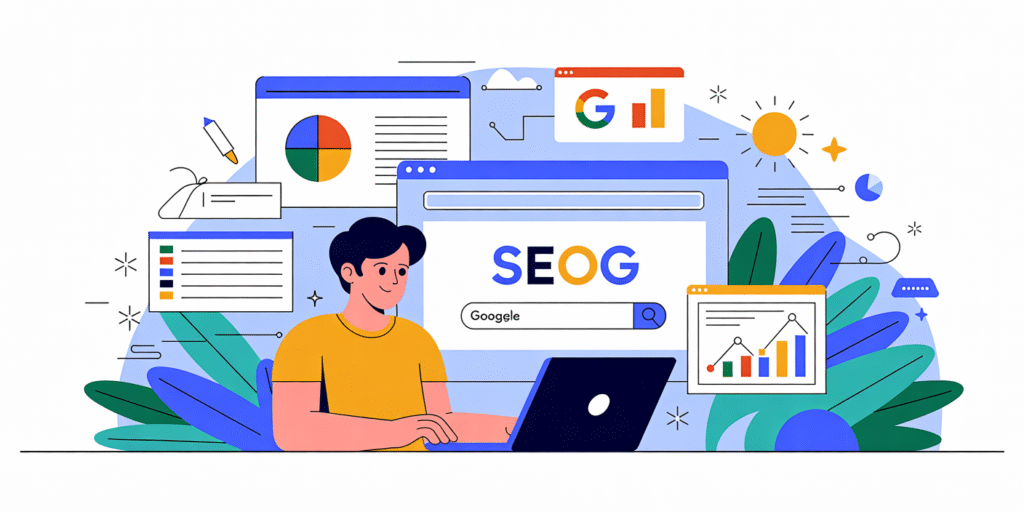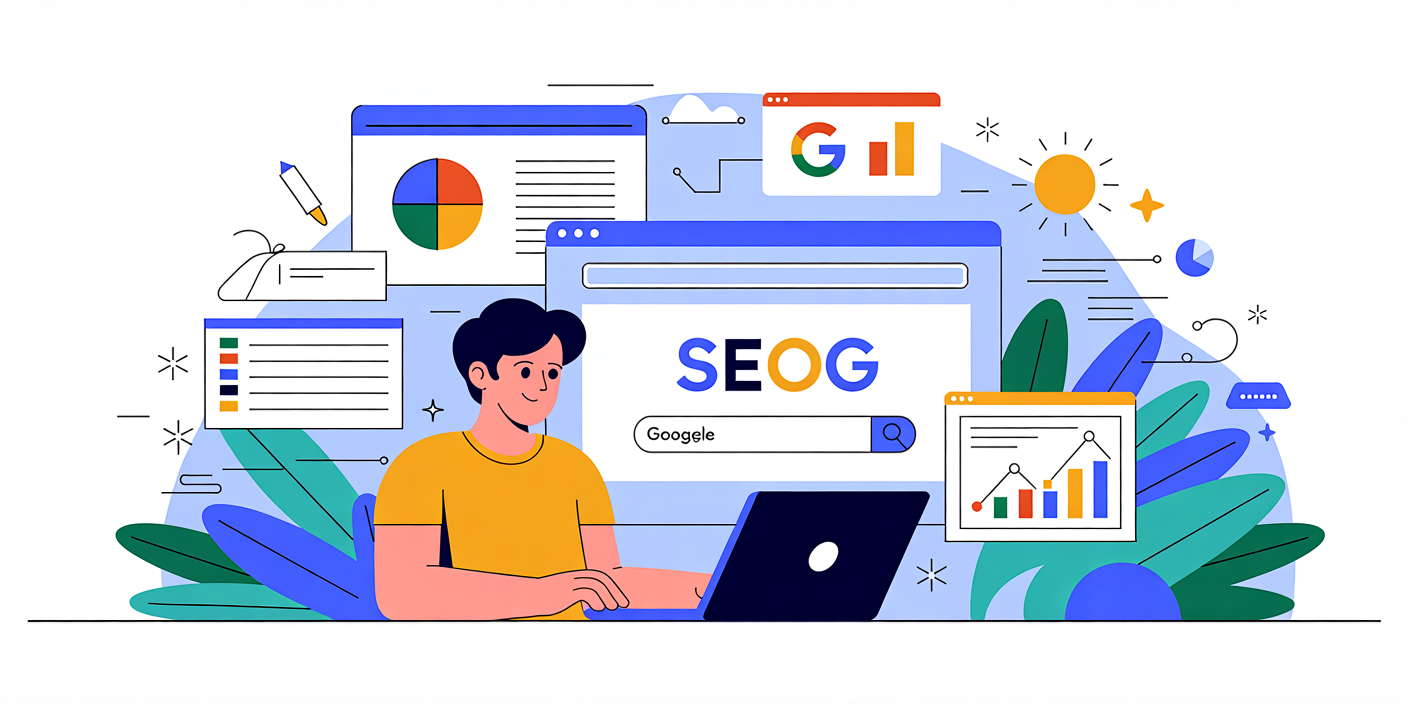Introduction
Are you a digital marketing working professional, freelancer, or Small business owner? In 2025, online visibility is everything.
What do you do if you don’t want to spend any money on ads and still want people to find your website?
Yes, SEO is the answer, and it is much simpler than you think.
In this SEO for beginner’s guide blog post, you’ll learn what SEO is, why it’s so important, and how you can start applying simple SEO strategies even if you’re just starting out.
- Table of Content
- Introduction
- What is SEO
- Why SEO is Impotent in Digital Marketing
- How do search engines work?
- Black Hat vs. White hat SEO
- Seo basics for beginners (3 Main types )
- How to start SEO as a beginner
- 3 common myths about SEO
- Download My SEO Checklist for Beginners.
1. What is SEO? (In Simple Terms)

SEO stands for Search Engine Optimization.
In simple words, SEO is the process of making your website or content appear in search engines like Google when someone searches for a related topic.
Example:
Suppose you wrote a blog titled “best marketing tools for small businesses.” An SEO optimized blog has a chance of showing up on Google when that phrase is searched.
In a nutshell, SEO assists in ensuring your content:
- Appears in search results
- Provides access to organic traffic.
- Reaches the intended audience
2. Why SEO is Important in Digital Marketing
In this day and age, attention has become a currency that can be traded. If your audience does not find you, your website will stagnate.
Here’s why SEO matters more than ever in 2025:
1. It Creates Sustaining Free Traffic
Your content may require some initial investment to optimize, but once it’s ranking, it can deliver traffic for years without incurring renewal expenses.
2. It Cultivates Trust And Authority
People trust Google’s top results. Ranking higher = more credibility for your brand.
3. Reap Traffic and Conversion
A search for “best yoga classes near me,” embodies a user under high intention to act. Those users are delivered through SEO.
3. How Do Search Engines Work?
Like other search engines, Google has its own proprietary algorithms for locating content on the web, interpreting it, and assigning it a rank. This process takes place in three separate steps:
1. Crawling
As a first step, webpages are scanned by bots, also known as spiders, which are sent out by the search engine. These bots go to various sites, read the content on each one, and use links to access new pages.
✅ Tip: Ensure that your website is crawlable by providing a sitemap through Google Search Console.
2. Indexing
After ingesting the data, Google saves the information in its storage. This phase is called indexing. If a web page has not been indexed, it cannot be searched.
✅ Tip: Avoid duplicate content, diverse meta tags, and a structured site hierarchy for better indexing.
3. Ranking
Following the indexing of your webpages, Google ranks them according to numerous criteria. These criteria may include relevance to the keywords, ease of use, mobile optimization, number of backlinks and many others.
✅ Tip: Content that is specific, informative, high-value, and optimized is bound to rank better.
4. Black Hat SEO vs White Hat SEO
For beginners, understanding the difference between black-hat and white-hat SEO is of utmost importance if they are looking for sustainable results over time.
🟦 What is Black Hat SEO?
Black Hat SEO involves desperate attempts to gain a website ranking using unethical and unnatural means, seeking only rapid results. These attempts include:
Stuffed Keywords
Back Link Purchases
Cloaking (showing different content to users and search engines)
Concealed texts or hyperlinks
❌ These methods may seem beneficial during the initial stages, they will eventually lead to severe loss by incurring a penalty or permanent ban from search engines.
🟦 What is White Hat SEO?
These strategies are deemed legal by Google, as they create a constructive approach to site governance. Providing value through the strategy is imperative. Such practices include:
Conducting effective keyword strategy
Easy access to mobile-ndly websites
Quality-rolled content
Systemized site optimization
Natural Backlink Construction
✅ White Hat SEO helps build ineffable trust and sustainable growth over a considerably longer period.
5. SEO Basics for Beginners (3 Main Types)
In this search engine optimization for beginners guide, SEO can be broken into three main categories. If you can understand these 3 typetypes,will give you a strong foundation in search engine engine optimization skill
1. On-Page SEO
This applies to everything done within the confines of the website. It includes:
Placing appropriate keywords within the articles,
Crafting optimized titles and meta descriptions,
Adding internal links,
Maintaining a proper heading structure like H1, H2, H3. H3.
2. Off-Page SEO
These refer to actions that are taken externally to the website: acquiring backlinks from other sites, social media shares, and guest blogblogging.
3. Technical SEO
This deals with the technical aspects of your website – how well everything functions.
Mobile responsiveness,
page speed,
proper indexing and sitemaps, and having SSL (HTTPS) all fall under this.
6. How to Start SEO as a Beginner ?
If you’re completely new, here’s a simple step-by-step Beginners guide to learn search engine optimization
Step 1: Create Your Website or Blog
Establish an online presence through WordPress, Wix, or any other platform.
Step 2: Do In-Depth Word Research
In this step you have Use free tools like Ubersuggest, Google Keyword Planner, or AnswerThePublic; you have to find low-competition keywords that people are searching for.
Step 3: Write SEO-Optimized Content
After finding the low competition keywords by using Tools Now you have to create helpful, and high-quality content that solves the reader’s challenges. But you have to Use keywords naturally in your:
- Title
- First paragraph
- Subheadings
- Image alt tags
Step 4: Share Your Content
Share and engage with niche communities. Request other sites to link to your content so that you can gain backlinks.
7. 3 Common Myths About SEO (Don’t Fall for These)
1. SEO is dead.
Truth: SEO is very much effective, and it is being changed for the better. Daily use of Google still exists as does the competition in ranking.
2. You need to pay to rank
Truth: Organic SEO strategies make it possible to earn a spot without paying as long as you choose low competition keywords.
3. SEO requires coding skills
Truth: The Basics Make No Demand For Programming Skills. It is done simply for WordPress users who have the appropriate plugins like Rank Math or Yoast.
Conclusion: Your Next Step Toward SEO Success
SEO might seem overwhelming at first, but you don’t need to know everything to start.
Focus on the basics: research the right keywords, write useful content, and improve your site gradually.
Every small action compounds. Keep learning, keep publishing, and results will follow.
Free Bonus: Download My “SEO Checklist for Beginners” (PDF)
Want a simple 1-page guide that helps you optimize every blog post step-by-step?
Click here to download the free checklist
Let’s Connect!
If you’re a freelancer, beginner, or digital marketer trying to get organic traffic, I’m here to help.
DM me or leave a comment; I’ll personally guide you.

